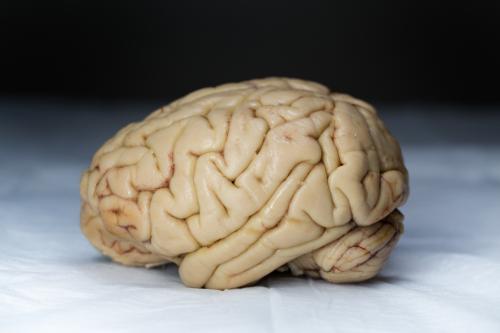BS in Neuroscience
The Bachelor of Science in Neuroscience degree is ideal for students planning on graduate school or careers in health and medicine. The program provides rigorous, interdisciplinary education in molecular, cellular and cognitive neuroscience, resulting in a comprehensive understanding of the mechanisms and circuitry in the brain that drive behavioral outputs.
While critically evaluating and applying the core experimental methods used in molecular neuroscience and neurobiology, students become fluent in the core concepts, methods and current literature involved with modern neuroscience.
Questions about this major? Contact Neuroscience Program Director damienoh![]() gwu [dot] edu (Damien O’Halloran).
gwu [dot] edu (Damien O’Halloran).
Note: Students who declare a major in neuroscience are unable to double major in biology or attain a biology minor.
Course Requirements
For detailed guidance on BISC 4171, BISC 4171W, and BISC 4172W, visit the Undergraduate Biology Research Courses page.
The following requirements must be fulfilled:
The general requirements stated under Columbian College of Arts and Sciences, Undergraduate Programs.
Program-specific curriculum:
| Code | Title | Credits |
|---|---|---|
| Required | ||
| 38 or 41 credits (10 or 11 courses) in basic science 1 | ||
| BISC 1111 | Introductory Biology: Cells and Molecules | |
| BISC 1112 | Introductory Biology: The Biology of Organisms | |
| BISC 2207 | Genetics 2 | |
| or BISC 2202 | Cell Biology | |
| CHEM 1111 | General Chemistry I | |
| CHEM 1112 | General Chemistry II | |
| CHEM 2151 & CHEM 2153 | Organic Chemistry I and Organic Chemistry Laboratory I | |
| CHEM 2152 & CHEM 2154 | Organic Chemistry II and Organic Chemistry Laboratory II | |
| PHYS 1025 | University Physics I with Biological Applications | |
| or PHYS 1011 | General Physics I | |
| or PHYS 1021 | University Physics I | |
| PHYS 1026 | University Physics II with Biological Applications | |
| or PHYS 1012 | General Physics II | |
| or PHYS 1022 | University Physics II | |
| MATH 1220 & MATH 1221 | Calculus with Precalculus I and Calculus with Precalculus II | |
| or MATH 1231 | Single-Variable Calculus I | |
| 6 credits (two courses) in quantitative methods, selected from the following: | ||
| BISC 2585 | Biometry | |
| CSCI 1012 | Introduction to Programming with Python | |
| DATS 1001 | Data Science for All | |
| DATS 2102 | Data Visualization for Data Science | |
| DATS 2103 | Data Mining for Data Science | |
| DATS 2104 | Data Warehousing for Data Science | |
| PUBH 3201 | Introduction to Bioinformatics | |
| STAT 1127 | Statistics for the Biological Sciences 2 | |
| 9 credits in three gateway courses that introduce core neuroscience concepts, selected from the following: | ||
| ANAT 2160 | Human Functional Neuroanatomy | |
| or SLHS 2106 | Neural Substrates of Speech, Language, and Hearing | |
| BISC 2320 | Neural Circuits and Behavior | |
| BISC 3320 | Human Neurobiology | |
| PSYC 2015 | Biological Psychology | |
| 15 credits (five courses), taken in the following three categories: | ||
| Cellular/molecular/systems neuroscience: 6 credits (two courses), selected from the following: | ||
| ANTH 3413 | Evolution of the Human Brain | |
| BISC 2220 | Developmental Neurobiology | |
| BISC 3214 | Developmental Biology | |
| BISC 3320 | Human Neurobiology | |
| PSYC 3199 | Current Topics in Psychology | |
| Cognitive neuroscience: 6 credits (two courses), selected from the following: | ||
| PSYC 3118 | Neuropsychology | |
| PSYC 3121 | Memory and Cognition | |
| PSYC 3122 | The Cognitive Neuroscience | |
| PSYC 3124 | Visual Perception | |
| PSYC 3127 | Social and Affective Neuroscience | |
| SLHS 2133 | Autism | |
| SLHS 3116 | Brain and Language | |
| Advanced biochemistry: 3 or 4 credits (one course), selected from the following: | ||
| BISC 3261 | Introductory Medical Biochemistry | |
| CHEM 3165 | Biochemistry I 2 | |
| CHEM 3166 | Biochemistry II | |
| Research/laboratory experience | ||
| 3 or 4 credits in a research/laboratory experience, which may be fulfilled by one semester of guided or independent research in ANTH, CHEM, PHIL, PSYC, or SLHS, or in one of the following courses: 3 | ||
| BISC 2452 & BISC 2453 | Animal Behavior and Animal Behavior Laboratory | |
| BISC 4171 | Undergraduate Research | |
| or BISC 4171W | Undergraduate Research | |
| BISC 4172W | Research Internship and Writing in Biology | |
| BISC 4180 | Undergraduate Research Seminar | |
| PSYC 4106W | Research Lab in Sensation and Perception | |
| PSYC 4107W | Research Lab in Cognitive Neuroscience | |
138 credits (10 courses) if MATH 1231 is taken; 41 credits (11 courses) if MATH 1220 and MATH 1221 are taken.
2Recommended for premed students. In addition, premed students are advised to take BISC 2322, BISC 2337, and SOC 1001.
3SLHS courses are available only to students with a minimum GPA of 3.5 in major courses and/or the permission of the instructor.


